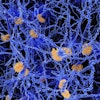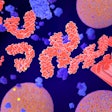
Diadem is touting findings from three studies that point to the potential effectiveness of its AlzoSure blood-based biomarker assay to identify individuals with a high risk for developing Alzheimer's disease (AD).
AlzoSure is a plasma-based biomarker designed to predict the likelihood that a patient will develop Alzheimer's. Using patented technology, the assay employs an antibody that binds to a conformational variant of the p53 protein, U-p53AZ, which is a protein that plays a key role in AD progression.
Diadem shared the results of three studies highlighting how researchers could use U-p53AZ and AlzoSure to predict AD onset years before symptoms appear.
In the first study, published on December 3 in Alzheimer's Research & Therapy, researchers described how p53 dysregulation may exacerbate AD pathology. The authors concluded that p53 does have the potential to serve as a biomarker for early detection of AD.
In the second publication, published December 26 in Journal of Personalized Medicine, researchers specifically assessed Diadem's blood-based prognostic test in a longitudinal study of 375 patients. The authors confirmed Diadem's antibody can reliably recognize the U-p53 conformation variant and said U-p53AZ levels in blood showed high accuracy for discriminating between people with mild cognitive impairment who did and did not develop AD.
The third and final publication was released as a preprint on January 26 and included results from a longitudinal study on AlzoSure. The authors demonstrated that U-p53AZ predicted progression from mild cognitive impairment to AD at least 36 months before alternative diagnosis. In one patient, U-p53AZ levels predicted AD advancement at least six years before the patient developed AD symptoms.



















